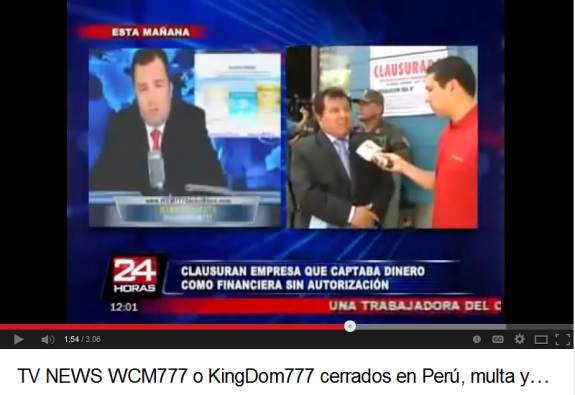
Still using social-media sites to promote massive fraud schemes — even after the AdSurfDaily, Zeek Rewards and Profitable Sunrise debacles?
Thanks to his presence on social media, Harold Zapata, a WCM777 YouTube pitchman named a respondent in a Desist and Refrain order announced last month by California’s Department of Business Oversight, may be trapped between a rock and a hard place.
Zapata is a California resident. Not only does the state know about his YouTube presence — indeed, his promos are referenced in the D&R — so do authorities in Peru. Whether Zapata ever has ventured to Peru is unclear. What is clear is that Peruvian media have used snippets of his U.S.-based promo as a backdrop to video reports about a police raid against a local WCM777 outlet in Lima.
Whether he likes it or not, Zapata has become one of the American faces for WCM777. In one video, Zapata identified himself as a WCM777 “director . . . working directly with our founder, CEO, chairmans [sic], leaders in our WCM777 organization.”
WCM777 executives include Ming Xu and Zhi Liu, California said. Both men are named in the D&R. Zapata also is named.
California’s action against WCM777, its executives and Zapata may signal trouble for other YouTube pitchmen for highly questionable MLM “programs” or outright scams. For starters, YouTube commercials for HYIPs sometimes are copied and used by promoters of the same purported “opportunity,” thus saving fellow pitchmen the time and trouble of making their own videos. This can happen with or without permission, perhaps with an eager recruit using the video of another sponsor but inserting a URL to the recruit’s page in a companion text pitch below the actual video.
Beyond that, some fraud-scheme pitchmen openly share their YouTube promos with downline recruits as a means of driving more business to a scam. Such approaches typically are portrayed as the acts of a helpful sponsor who wants to see his or her recruits thrive by providing them the “tools” they need to succeed.
At least one YouTube pitchman for WCM777 appears to be using Zapata’s video to drive traffic to WCM777 and possibly other “opportunities.”
Zapata appears to have noticed this at least two months ago and placed warnings in Spanish and English on the YouTube site of the fellow WCM777 pitchman.
Here’s how the warnings read (italics added):
Por favor quite este video inmediatamente o me veo obligado a reportarte por infracción de copyright, de este video.
Please remove this video immediately or I will be forced to report this video for copyright infringement.
The video nevertheless remains. It shows Zapata pitching WCM777 in English, even after the California action and the raid in Peru. The title of the video on the fellow WCM777 pitchman’s site is “WCM777. FULL PRESENTATION IN ENGLISH.”
It is unclear from Zapata’s warnings whether he was upset that the video was being used without his permission or whether he was concerned that the fellow WCM777 pitchman was using the video to cherry-pick Zapata’s earnings.
Regardless of Zapata’s specific concerns, however, the continued appearance of the video shows the vulnerability of MLM pitchmen who promote “programs” on YouTube. Such promoters not only may lose control over their own content, they literally may lose control over their own faces.
Even if Zapata has stopped promoting WCM777, the video published by the fellow WCM777 pitchman makes it appear as though Zapata still is promoting the purported opportunity, which California publicly declared a scam last month. Last week, the state asked residents who invested in WCM777 to contact the DBO immediately.
At least 5,500 Californians plowed money into the WCM777 scam, the state said.
“The California Department of Business Oversight has seen a surge of high-yield investment schemes that take advantage of social networks to market illegal investments,” said Jan Lynn Owen, commissioner of the Department of Business Oversight. (Bolding added by PP Blog.)
In 2010, FINRA called the HYIP sphere a “bizarre substratum of the Internet” and issued a warning that such schemes were spreading on social-media sites such as YouTube, Facebook and Twitter. Zapata’s experience demonstrates that some HYIP pitchmen either missed the warning or chose to ignore it.
BehindMLM.com is reporting that WCM777 — now operating as Kingdom777 — appears now to be engaging in ham-handed wordplay to continue its duping of the masses. The “program,” BehindMLM reports, now is using the word “members” and trying to steer clear of the word “investors.”
Such wordplay bids foreshadowed doom at both AdSurfDaily, a $120 million Ponzi scheme, and Zeek Rewards, which allegedly gathered at least $850 million.
As the PP Blog reported in June 2012, here is part of what the U.S. Secret Service said in a filing in the ASD Ponzi-scheme case in February 2009 (italics’bolding added):
[ASD operator Andy] Bowdoin and his sponsor knew that it was illegal to sell investment opportunities to thousands of individuals; thus, they were careful not to call participants “investors” but rather referred to them as “members.” Moreover, there were careful not to call payments to “members” “return on investments”; rather, they referred to the income program as a “rebate” program . . .
The document cited above is available at the top this PPBlog story about the then-active Zeek Rewards Ponzi scheme: EDITORIAL: A Friday Evening In MLM Radio La-La Land. (Document courtesy of the ASD Updates Blog.)
For whatever reason, HYIPs and their pitchmen apparently continue to believe they can duck or circumvent securities regulations and laws against the sale of unregistered securities by calling an investment something else.
Prosecutors made short work of the Zeek and ASD wordplay, saying both “programs” engaged in linguistic games to describe an investment as something else.
WCM777 even may dialing up the HYIP wordplay madness. From BehindMLM.com (italics added):
A “dividend” [at WCM777/Kingdom777] is now a “bonus”… cuz well, a bonus could be anything… including an investment “return”, which is now also just a “bonus”.